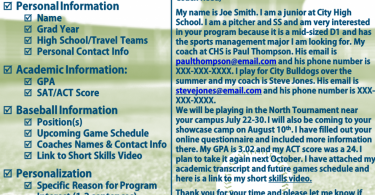Congratulations on receiving interest from college baseball programs! Your ability to communicate well throughout the recruiting process is one of the tests that coaches will use to see if you are ready to handle the...
Step 6: Ongoing Communication With Coaches
Do This
✅Start to narrow your list of schools as you get deeper into your recruitment and communication (or lack of communication) with coaches, and get a better feel for the characteristics and qualities you want from a college/baseball program
✅Work on your body language, presence, and composure
✅Ask questions to coaches that help you get the information you need about each school and baseball program to determine if it would be a good fit for what you are looking for
✅When it isn't clear, ask coaches you have been communicating with where you stand on their recruiting list, what their level of interest is, and what their expectations are moving forward
✅Continue to do research on the coaches, programs, and schools that you are in communication with
✅Continue to respond to emails and phone calls from college coaches as promptly as possible to show that you are a consistent and reliable communicator
✅Continue to follow up on ignored emails and phone calls after 1-2 weeks to verify that coaches received them and reiterate interest
✅Work to set up campus visits with the schools that are recruiting you and/or visit schools of interest and let the coaching staff know you will be on campus and are interested in their program
Learn About This
✅Learn about why it’s important you take the lead in communication with coaches
✅Learn about why it’s important to keep an open mind and your options open when hearing from new schools or communicating with schools that you are not familiar with
✅Learn about best practices for creating strong and reliable patterns of communication with college coaches
✅Learn about how being reliable, responsive, and clear in your communications can show interest, demonstrate important qualities that college coaches look for in recruits, and help you get recruited
✅Learn about the importance of honest communication and how honesty builds the foundation for a lasting relationship and program fit
Read This
Step 6: What to Read and Research
The ‘Read This’ section of Step 6 aims to make you a master at communicating with college baseball coaches. The resources under ‘Read This’ for Step 6 will: Give you tips on how to successfully communicate...
Academics
When things in the recruiting process start to pick up, it's easy to push academics to the side. DON'T! When you are communicating with coaches and receiving interest is the time to double down on academics, not neglect them. The last thing a coach wants to see is a player whose academics take a hit when things get busy. In college, baseball players always have a full schedule. Players who can't keep up with the academic workload in high school are a big red flag to college coaches, who know it only gets busier and harder in college. Keep your academics a priority!
Player Development
You are finally in the fun part of the recruiting process and getting to talk with interested college coaches. What you may not realize is that these college coaches are now a great resource for you. Ask them for feedback on where they would like to see you make improvements and use the feedback to improve your development plan. Ask them what they are using to develop their players and take bits and pieces that you like to apply to your training.
Now, more than ever, is the time to seek out objective and honest feedback about what level you could play in college. The college coaches can help provide you with this. What level are the coaches who are interested in you?
What do they like? What would they like to see you improve on? What would they change about your game or work on if you were in their program right now? Stay hungry for the truth about your abilities and keep setting goals and that will help you meet the standards of the level you want to play in college. Development is still your key, but you now have more resources to help you fine tune your process. Use them!




